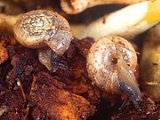
Zonitoides arboreus
Encyclopedia
Zonitoides arboreus is species
of small air-breathing land snail
, a terrestrial
pulmonate gastropod mollusk in the family Gastrodontidae
.
The non-indigenous distribution includes:
In most cases listed above (but not all of them), this species is found as a pest in greenhouse
s.
is pale yellowish brown, translucent, faintly and irregularly striated. The shell has 4-4.5 whorls
. The shell is sometimes very slightly keeled. The umbilicus is deep and contain 1/7 of diameter. There is broadening at the last whorl.
The width of the shell is 4.5-6 mm. The height of the shell is 1.7-3 mm.
Snails in this species create and use love darts.
Parasites of Zonitoides arboreus include:
Species
In biology, a species is one of the basic units of biological classification and a taxonomic rank. A species is often defined as a group of organisms capable of interbreeding and producing fertile offspring. While in many cases this definition is adequate, more precise or differing measures are...
of small air-breathing land snail
Land snail
A land snail is any of the many species of snail that live on land, as opposed to those that live in salt water and fresh water. Land snails are terrestrial gastropod mollusks that have shells, It is not always an easy matter to say which species are terrestrial, because some are more or less...
, a terrestrial
Terrestrial animal
Terrestrial animals are animals that live predominantly or entirely on land , as compared with aquatic animals, which live predominantly or entirely in the water , or amphibians, which rely on a combination of aquatic and terrestrial habitats...
pulmonate gastropod mollusk in the family Gastrodontidae
Gastrodontidae
Gastrodontidae is a family of air-breathing land snails, terrestrial pulmonate gastropod mollusks in the clade Eupulmonata ....
.
Distribution
The native distribution of Zonitoides arboreus includes:- North America
The non-indigenous distribution includes:
- introduced to Iceland
- Hungary
- Switzerland
- Czech Republic - non-indigenous in Moravia since 2006
- Great Britain - non-indigenous as a "hothouse alien"
- Slovakia - non-indigenous as a "hothouse alien"
- Pratas IslandsPratas IslandsThe Pratas Islands or Dongsha Islands consists of three islands forming from an atoll located in northeastern South China Sea, southeast of Hong Kong. The islands are governed by the Republic of China . The People's Republic of China claims sovereignty over these islands along with all other...
, Taiwan - and other parts of the world
In most cases listed above (but not all of them), this species is found as a pest in greenhouse
Greenhouse
A greenhouse is a building in which plants are grown. These structures range in size from small sheds to very large buildings...
s.
Description
The shellGastropod shell
The gastropod shell is a shell which is part of the body of a gastropod or snail, one kind of mollusc. The gastropod shell is an external skeleton or exoskeleton, which serves not only for muscle attachment, but also for protection from predators and from mechanical damage...
is pale yellowish brown, translucent, faintly and irregularly striated. The shell has 4-4.5 whorls
Whorl (mollusc)
A whorl is a single, complete 360° revolution or turn in the spiral growth of a mollusc shell. A spiral configuration of the shell is found in of numerous gastropods, but it is also found in shelled cephalopods including Nautilus, Spirula and the large extinct subclass of cephalopods known as the...
. The shell is sometimes very slightly keeled. The umbilicus is deep and contain 1/7 of diameter. There is broadening at the last whorl.
The width of the shell is 4.5-6 mm. The height of the shell is 1.7-3 mm.
Ecology
Zonitoides arboreus is common in woodlands and humid habitats, also in gardens. In Europe it is found in greenhouses, and is occasionally reported outside as an escape.Snails in this species create and use love darts.
Parasites of Zonitoides arboreus include:
- Parelaphostrongylus tenuisParelaphostrongylus tenuisParelaphostrongylus tenuis is a small parasitic nematode that infects the brain of many ungulates. Its natural host, the white-tailed deer, is unaffected by its presence; other species, however, suffer severe neurologic damage that eventually leads to death...
External links
- http://www.livinglandscapes.bc.ca/cbasin/molluscs/zonitidae.html

